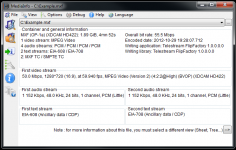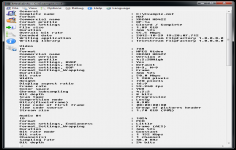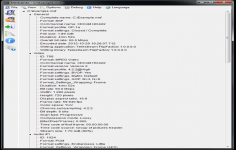 MediaInfo 0.7.70
MediaInfo 0.7.70
MediaArea.net SARL - ( Open Source)
The codec used by a particular video is now very easy to find using the useful application named MediaInfo.
MediaInfo is a quick and effective tool developed to offer detailed information about the multimedia documents such as the codec used by a particular video.
The application is able to scan the files and then indicate the audio (MP3, Flac, AAC, WMA) and video (DivX, XviD, H264/AVC, WMV) codecs used. A link to the website to download the codec is also available, offering the possibility to install the codecs in a very convenient way.
MediaInfo is able to provide lots of information, including the number of frames per second, the rate used, the sampling frequency audio tracks or the number of channels available. MediaInfo also integrates to the context menu of Windows Explorer to access information from a sequence with a few clicks.
Its interface is more than simple: with just a point to the file or directory containing audio files and / or video it scans them presenting the result in different ways such as table, tree, plain text, or HTML page. Data can also be exported into text, HTML or CSV.
- Title:
- MediaInfo 0.7.70
- File Size:
- 4.6 MB
- Requirements:
- Windows (All Versions)
- Language:
- en-us
- License:
- Open Source
- Date Added:
- 04 Sep 2014
- Publisher:
- MediaArea.net SARL
- Homepage:
- http://www.mediainfo.sourceforge.net
- MD5 Checksum:
- 691692C2AFCF32FA9C8226D31810758D
- DTS Neural Audio: display of DTS Neural Audio descriptor information (matrix encoded channels count and position)
- FFV1: version, bit depth, color space, chroma subsampling, versions 0 to 3
- HuffYUV: version, bit depth, color space, chroma subsampling, versions 1 to 3
- PDF: basic detection (goal is to detect PDF/A profile)
- HLS: support of encrypted streams (key must be in FileName.FileExt.key or provided via the library API)
- CDP: using CDP service descriptor for the list of 708 services + language information
- MXF: showing the real bit depth ("Quantization bits"); the count of bits stored in the file is in a new field "Stored bit depth" if it differs
- MXF: Audio "frame rate" (how PCM content is split in packets) information
- MXF: Audio block alignment byte size (hidden by default)
- VC-3: adding the commercial name "DNxHD" + bitrate class
- MXF: SMPTE ST 377-4 (MXF Multichannel Audio Labeling Framework)
- MXF: "ChannelLayoutID" new field (hidden by default) containing the MXF Channel Assignment Label
- Wave64: Duration
- CDP: frame rate
- IMF: improvements (still work in progress)
- QuickTime: ia13 CodecID
- CDP: using ccsvcinfo_section() for service presence and language information
- MXF/CDP: law rating (from CEA-608 XDS) information added (other containers were already supported)
- CEA-608: Program name information
- BMP: support of OS/2 headers
- HLS: com.apple.streaming.transportStreamTimestamp support
- ISM: ISMT / text (TTML) streams support
- MXF: detection of buggy BlockAlign from some muxers, so PCM bit depth is correctly detected despite the buggy metadata
- HEVC: library name of some encoding libraries
- MPEG-2 Video: picture structure for interlaced content (interlaced content can have a frame structure)
- HLS: support of some encrypted files (AES-128 with default IV and per segment), key is provided by the command line --File_Encryption_Key=(Base64 data)
- HEVC: adding support of x265 library name and x265 encoding settings
- ProRes: more details about ProRes in AVI or Matroska
- DV: support of AVd1 CodecID
- CMake: scripts improvements
- Matroska: file name of attachments
- HEVC: some streams with VUI were not parsed
- MPEG Video: was not correctly handling 1000:1001 frame rates and NDF time codes combination during frame count computing
- MPEG Video: was not correctly detecting the time stamp of the first frame in case of closed GOP with first frame not the I-frame
- XDCAM: information about the MXF header presence was not provided if MOV header has a glbl atom
- Some specific C++11 code is removed for full compatibility with older C++
- MXF: Time codes values were buggy in case of MXF with pre-charge ("Origin" not 0)
- MPEG-4 Visual: wrong analysis in case on video_object_layer_shape not set to regular
- MPEG-4/MOV: trying to display the summary differently when there is a difference between container and raw stream channels count information (long term method to be discussed)
- Non-Unicode version was not building anymore
- DyLib: trying to have a better support of pure C compilers
Related software
2.2/5 from 178 users


